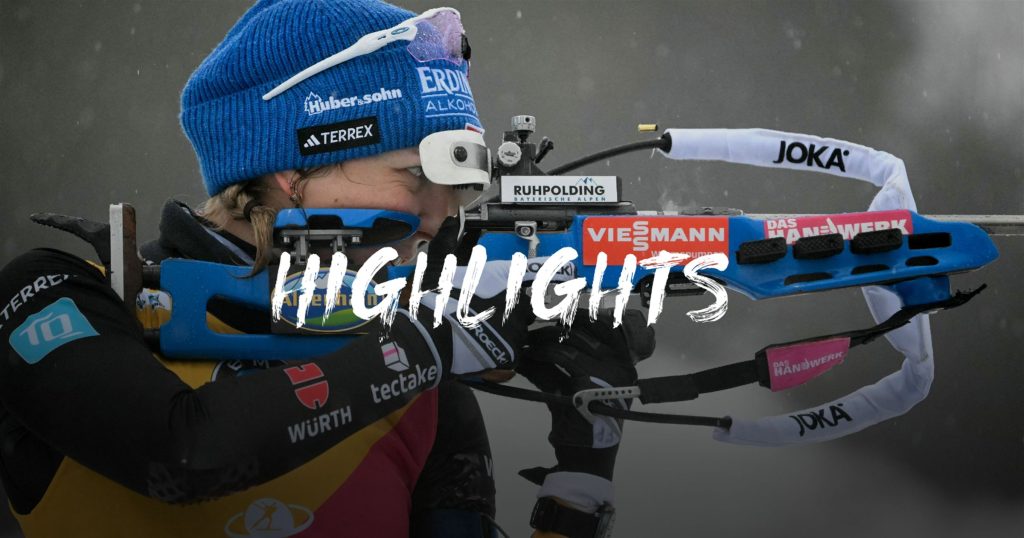Paula Botet of France etched her name into the annals of biathlon history, securing her maiden World Cup victory in a thrilling 7.5km sprint competition held in Oberhof, Germany. This triumph not only marked a personal milestone for Botet but also underscored the evolving dynamics of the sport, as emerging talents challenge established powerhouses. The Oberhof course, known for its demanding terrain and unpredictable weather conditions, provided a challenging backdrop for this pivotal race, ultimately showcasing Botet’s composure, accuracy, and strategic brilliance. Overcoming strong competition from established athletes, Botet’s victory signaled a potential shift in the biathlon landscape, hinting at a promising future for both the French team and Botet herself.
The challenging Oberhof course played a significant role in the race’s unfolding drama. Known for its steep inclines, rapid descents, and often capricious weather patterns, Oberhof demands not only physical prowess but also mental resilience and adaptability from its competitors. The ability to maintain focus and accuracy on the shooting range, amidst fluctuating wind conditions and the pressure of a World Cup race, is crucial for success in Oberhof. Botet masterfully navigated these challenges, demonstrating a remarkable blend of skiing speed and shooting precision that ultimately propelled her to victory. Her performance under pressure highlighted her developing maturity and tactical awareness, qualities that are essential for consistent success at the highest level of biathlon competition.
Maren Kirkeeide of Norway, a consistent presence on the World Cup circuit, finished in a respectable second place, reaffirming her status as a force to be reckoned with in women’s biathlon. Kirkeeide, known for her powerful skiing and consistent shooting, pushed Botet throughout the race, highlighting the high level of competition within the field. While the top spot eluded her on this occasion, Kirkeeide’s performance demonstrated her continued commitment to excellence and her ability to compete at the highest echelons of the sport. Her presence on the podium served as a reminder of Norway’s enduring strength in biathlon, a legacy built on a combination of talent, training, and national support.
Milena Todorova’s bronze medal represented a remarkable achievement for Bulgaria, showcasing the growing global reach of biathlon and highlighting the increasing competitiveness of nations beyond the traditional powerhouses. Todorova’s podium finish served as an inspiration to aspiring biathletes in Bulgaria and other emerging biathlon nations, demonstrating that with dedication and hard work, success on the world stage is achievable. Her performance injected further excitement into the race, underscoring the unpredictable nature of biathlon and the potential for surprises to emerge from unexpected corners of the competitive landscape.
Botet’s victory was not only a personal triumph but also a significant moment for French biathlon. It injected renewed hope and enthusiasm into the French team, demonstrating their potential to challenge the established hierarchy of the sport. Botet’s success serves as an inspiration to her teammates and aspiring French biathletes, demonstrating the possibility of achieving international recognition and success. Her win contributes to a growing sense of momentum within French biathlon, signaling a potential resurgence of the nation as a major player on the global stage. This victory could potentially pave the way for future success for French biathlon, inspiring a new generation of athletes and reinvigorating the national program.
Beyond the individual achievements and national implications, Botet’s victory serves as a testament to the dynamic and evolving nature of biathlon. It highlights the increasing depth of talent within the sport and the potential for unexpected outcomes. Her emergence onto the scene adds another layer of intrigue and excitement to the World Cup circuit, promising more thrilling competitions and compelling storylines in the future. Botet’s victory signifies not simply a changing of the guard but rather an expansion of the field of contenders, enriching the sport with new rivalries and compelling narratives. This evolution contributes to the sustained popularity of biathlon, capturing the attention of both seasoned fans and newcomers alike. The future of the sport seems bright, filled with potential and promising a continuation of the thrilling competitions that define biathlon at its best.














